

Control valves play a critical role in industrial systems by regulating the movement of fluids or gases. Two essential types are pressure control valves (PCVs) and flow control valves (FCVs). Understanding the difference between them is crucial for ensuring efficiency, system safety, and optimal performance.
The key difference? A pressure control valve maintains a constant pressure regardless of flow rate, while a flow control valve regulates the flow rate without directly controlling system pressure. However, adjusting one can impact the other, making it important to choose the right valve for your system. In this guide, we’ll explain how these valves work, how they are different, and how to choose the right one.
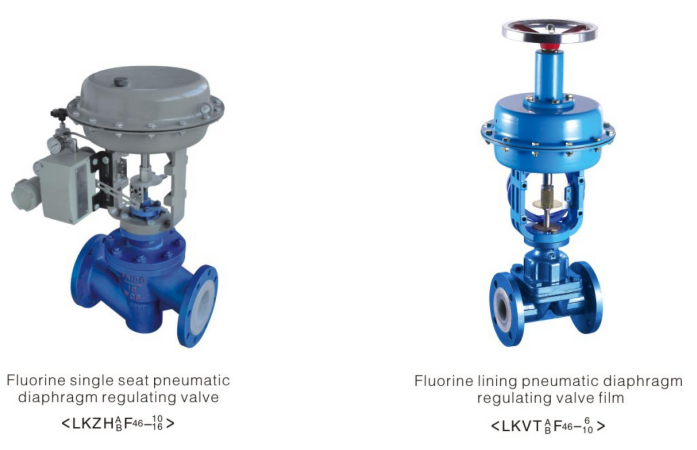
A pressure control valve regulates system pressure by opening or closing in response to changes in pressure. It ensures that downstream pressure stays within the desired range, preventing over-pressurization and equipment damage.
A pressure control valve (PCV) relies on pressure transmitters (PTs) to continuously monitor system pressure. These transmitters send real-time data to a control system, which adjusts the valve position using closed-loop feedback control to maintain the desired pressure level. Regardless of fluctuations in flow rate, the PCV ensures that pressure remains stable, preventing potential damage to equipment and providing consistent performance in industrial processes.
A flow control valve regulates the volume of fluid or gas passing through a system. It ensures that a set flow rate is maintained, independent of pressure changes.
A flow control valve (FCV) uses flow transmitters (FTs) to measure the rate at which fluid or gas moves through the system. The valve adjusts an orifice or opening to either increase or decrease the flow, ensuring the desired volume is maintained. By regulating flow, FCVs help optimize process speed and enhance overall system efficiency, making them crucial in hydraulic and pneumatic applications.
| Feature | Pressure Control Valve (PCV) | Flow Control Valve (FCV) |
| Function | Regulates pressure, keeps it constant | Adjusts flow rate, controls speed of fluid/gas |
| Control Logic | Uses pressure transmitters (PTs) | Uses flow transmitters (FTs) |
| Mechanism | Opens/closes based on pressure changes | Adjusts an orifice for precise flow regulation |
| Common Uses | Prevents overpressure, ensures stable operation | Controls speed of hydraulic/pneumatic actuators |
| Impact on System | Pressure remains steady, flow may vary | Flow is steady, pressure may fluctuate |
Yes, indirectly. A flow control valve restricts the amount of fluid passing through, which can cause a pressure drop downstream. However, its primary function is not pressure regulation.
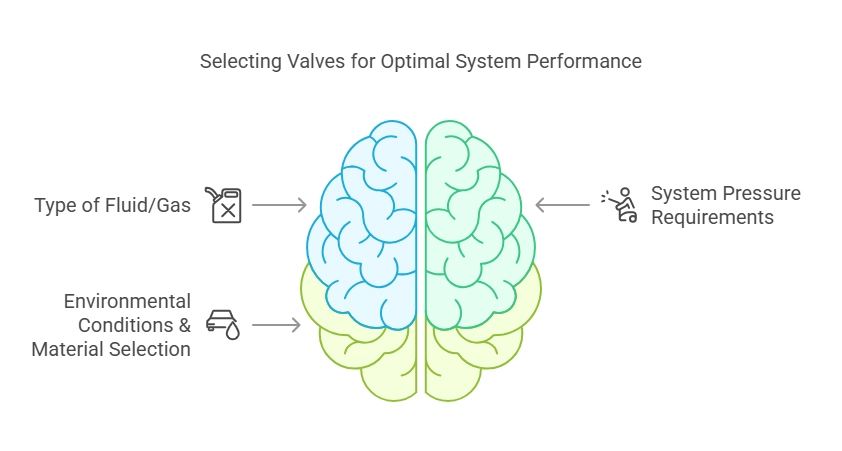
For applications involving high-pressure gases, a pressure control valve (PCV) is the best choice. These valves ensure that pressure remains stable, preventing damage to system components due to over-pressurization. On the other hand, when precise control over fluid flow is required, a flow control valve (FCV) is the better option. FCVs regulate the volume of fluid passing through a system, ensuring consistent flow rates and improving process efficiency.
In systems where pressure fluctuations could lead to equipment damage, pressure control valves (PCVs) are essential. They help maintain a stable pressure level, preventing excessive stress on sensitive components. On the other hand, if maintaining a steady flow rate is more critical than pressure control, a flow control valve (FCV) is the better choice. FCVs ensure a consistent volume of fluid or gas moves through the system, optimizing operational efficiency without direct pressure regulation.
For systems operating in corrosive environments, choosing a stainless steel or diaphragm-sealed pressure control valve (PCV) is ideal. These materials resist chemical degradation, ensuring durability. In applications involving high-viscosity fluids, a proportional flow control valve (FCV) offers better control, as it allows precise flow rate adjustments suited to thicker fluids, preventing clogging and maintaining smooth operation.
If your system needs both pressure stability and flow consistency, consider using a combination of pressure and flow control valves.
Pressure and flow control valves are both essential for maintaining stable and efficient industrial processes. PCVs regulate pressure, ensuring safety and reliability, while FCVs control flow rate, optimizing efficiency. Understanding their differences helps in making informed choices to improve system performance and longevity.
Explore the collection of Lianke Valve, offering durable and precise solutions designed for various industrial applications. Visit Lianke Valve to find the right valve for your specific needs and enhance your system’s efficiency today!
Meta Description:
Learn the difference between pressure control valves and flow control valves. Find out how PCVs regulate pressure and FCVs control flow. Get tips on choosing the right valve for your system.
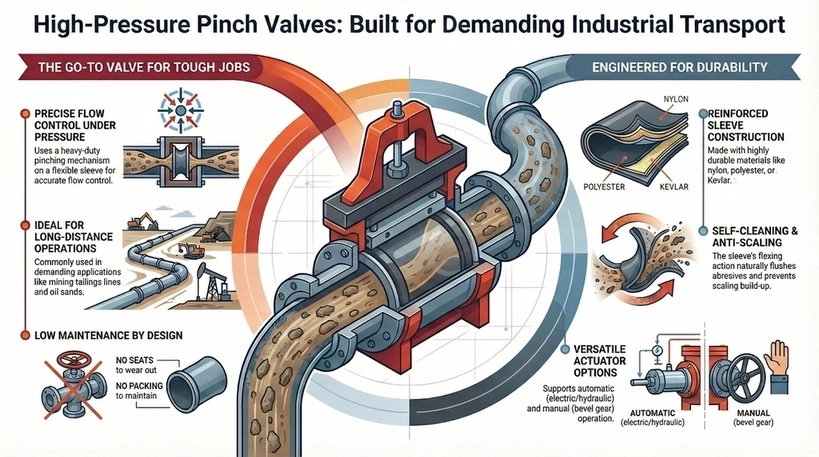
High pressure pinch valves, like PN16 pinch valve and class 150 pinch valve designs, involve a rugged and heavy-duty pinching mechanism in positioning the sleeve, resulting in an almost accurate and measurable flow of media. This kind of valve is popular and commonly used for long distance operations in mining tailings lines or oil sands, […]
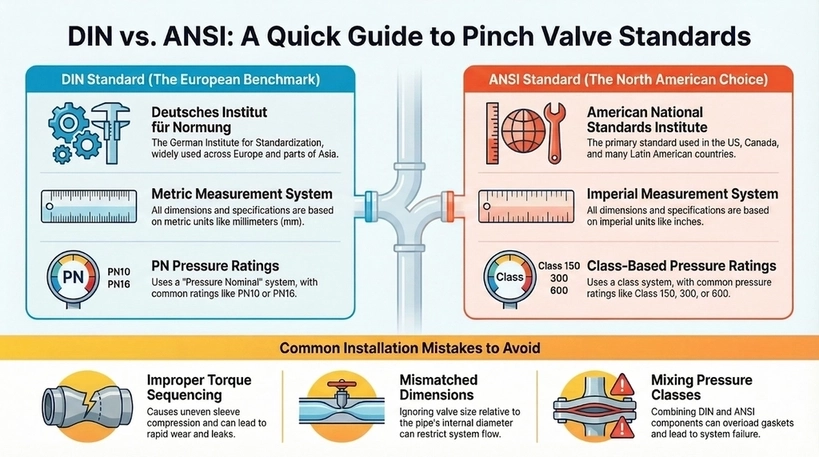
Understanding pinch valve dimensions and flanges ensures seamless integration into piping systems, particularly when choosing between DIN vs ANSI. The two are different but commonly used standards by organizations in engineering, manufacturing, and product design. DIN was developed in Germany but widely adopted across Europe and parts of Asia. Meanwhile, ANSI standards, which originate from […]

Selecting the appropriate explosion proof valve is essential for safety in industries that pose explosion risks. ATEX certified valves guarantee compliance with European standards, preventing ignition sources from heat, sparks, or static electricity. This blog explores key factors for choosing ATEX certified explosion proof valves that ensure overall operational safety, highlighting the entailed regulations and […]
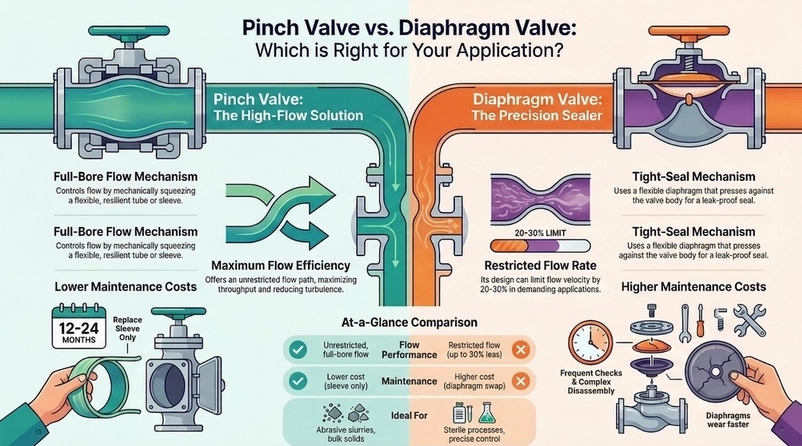
When handling abrasive or viscous media in industrial processes, the type of valve used can heavily affect the performance, efficiency, and overall user experience. In relation to this, two of the most common valve options are pinch and diaphragm valves. In this blog, we delve into the pinch valve vs diaphragm valve discussion, analyzing flow […]



